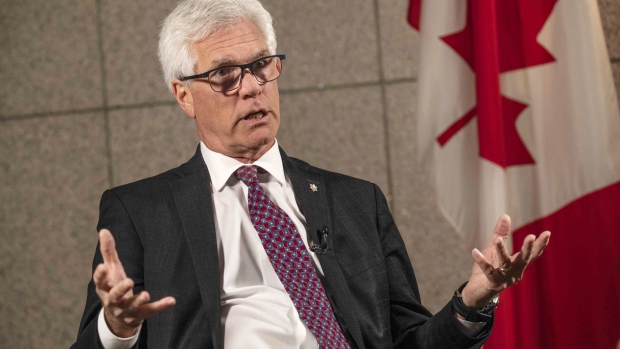Jan 20, 2019
Carr calls China's death sentence for Canadian citizen 'unacceptable'
, Bloomberg News

The operation of the World Trade Organization may soon stall because of U.S. delays in appointing new judges, Canada’s trade minister said as he prepares to convene another round of reform talks in Davos.
Jim Carr, in an interview with Bloomberg’s Kathleen Hays in Tokyo, said the U.S. refusal to appoint judges to the appellate body of the 164-nation WTO means that in “the next number of months” the WTO’s dispute settlement system will effectively stall. That lends urgency to talks set to take place on the sidelines of the World Economic Forum in Davos this week.
“The most urgent problem is the dispute settlement mechanism. Without any new judges being appointed, the gears are going to come to a halt. They’re going to slow down, and it will not be good news,” Carr said.
This week’s talks will be missing representatives from the U.S. and China, the world’s two largest economies, as other nations try to navigate the giants’ trade fight. “You’re not going to have a durable and lasting reform of the WTO unless you have China and the United States involved. You can’t start there, though. But that’s where we’re going to have to end up,” Carr said.
The trade minister’s comments come amid rising trade tensions globally, which have trade-reliant Canada -- the world’s 10th-largest economy, for which exports make up about a quarter of gross domestic product -- caught in the middle.
Canada, at the request of the U.S., arrested a Huawei Technologies Co. executive on Dec. 1, a move that has triggered a bitter, rising feud with Beijing. President Donald Trump has mused that he may abandon the case against the executive if he reaches a satisfactory trade deal with China, blurring the lines between trade posturing and law enforcement.
‘Unacceptable’ Sentence
China has since seized two Canadians -- former diplomat Michael Kovrig, and tour operator Michael Spavor -- and sentenced a third, Robert Schellenberg, to death in a drug case after initially sentencing him to a prison term. Canada is seeking the release of Kovrig and Spavor and a more lenient sentence for Schellenberg.
China and Canada are in a “tough patch” of a deep, longstanding relationship, Carr said. He called Schellenberg’s sentence “unacceptable” but said the countries will continue to work together.
“This is not a relationship that began yesterday. It goes back decades. It’s sophisticated, it’s multilayered,” he said, adding: “So we have to talk about the ongoing, continuing commercial relationship between these two countries, and a way through sorting out the current problem.”
‘Butchers Matter’
Carr spoke in Japan, the largest economy in the 11-nation Comprehensive and Progressive Agreement for Trans-Pacific Partnership, or CPTPP trade deal. Canada is the second biggest. Formerly the TPP, it was saved after Trump pulled the U.S. out of the deal shortly after he took office.
The first countries that ratified the CPTPP deal made their first two rounds of tariff cuts to start the year. Carr said there are “very positive reports already,” particularly among Canadian beef, pork and cereal producers, and that other countries are expressing interest “publicly and otherwise” in joining the pact.
“I was at a supermarket earlier in the day in Tokyo and talked to a butcher about selling Canadian beef in Tokyo. We have this great picture of a four year old with a Canadian flag eating a piece of Canadian beef, and a butcher holding up this big slab of Canadian tenderloin,” Carr said. “So, butchers matter.”
U.K. Trade Talks
Canada continues to watch Brexit proceedings -- the U.K. is Canada’s biggest European trading partner, and thus the crown jewel of an EU-Canada trade deal that provisionally kicked-in in late 2017.
After Brexit, Canada and the U.K. aim to reach some kind of deal to, essentially, copy-and-paste the EU trade deal over with tweaks. There are “continuing discussions both at the official level and at the political level with the U.K. to make sure everybody understands where everybody else is coming from,” Carr said.
As soon as possible after the U.K. exit from the EU, “we would like to sign an agreement with the U.K. which would be like the EU agreement. But we have to see what the conditions are,” Carr said. He said the U.K., despite not being a Pacific Rim nation, would also be welcome to apply to join the CPTPP.
“If they want to apply, and are prepared to meet the standards, of course they would be considered,” he said.
--With assistance from Kathleen Hays.
